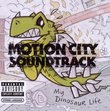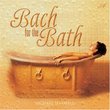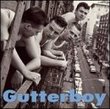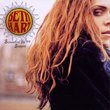| All Artists: Various Artists, Francis Ford Coppola Title: Apocalypse Now Redux Members Wishing: 4 Total Copies: 0 Label: Nonesuch Original Release Date: 8/15/1979 Re-Release Date: 7/31/2001 Album Type: Original recording remastered, Soundtrack Genres: Special Interest, Pop, Soundtracks Style: Vocal Pop Number of Discs: 1 SwapaCD Credits: 1 UPC: 075597964424 |
Search - Various Artists, Francis Ford Coppola :: Apocalypse Now Redux
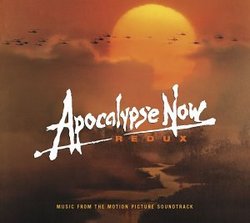 | Various Artists, Francis Ford Coppola Apocalypse Now Redux Genres: Special Interest, Pop, Soundtracks
In the mid to late '70s, director Francis Ford Coppola put his career on the line to complete Apocalypse Now, his quixotic attempt to variously document, deconstruct, and mythologize America's military involvement in Vietn... more » |
Larger Image |
CD DetailsSynopsis
Amazon.com In the mid to late '70s, director Francis Ford Coppola put his career on the line to complete Apocalypse Now, his quixotic attempt to variously document, deconstruct, and mythologize America's military involvement in Vietnam. The end result was a troubling masterpiece and technical tour de force whose use of sound and music influenced films for decades. As originally released, the soundtrack album was equally groundbreaking: an intriguing, dreamlike collage of dialogue, sound effects, and music that both evoked the film's artistic sensibility and underscored the innovative, Academy Award®-winning efforts of sound designer Walter Murch. Two decades later, Coppola revisited the project, adding nearly an hour of previously unseen footage and revamping its soundtrack release as well. But while the film may have taken on fresh new dimensions, the new soundtrack album seems stripped of virtually all of Murch's key contributions. What remains is primarily music--and a telling argument for the notion that the whole is considerably more than the sum of its parts. Inspired by synthesist Isao Tomita's '70s classical adaptations, Coppola hired father Carmine to write an orchestra score, and then set about synthesizing it. The Doors' "The End" remains an iconic touchstone, but removed from the context of the film (and its original album release), much of the Coppola music all too clearly reveals its inspirations (Tomita, Holst, Wagner, Stravinsky) and the technical limitations of the relatively primitive synth technology involved (mirrored in a pair of newly recorded tracks as well). --Jerry McCulley Similarly Requested CDs
|
CD ReviewsLike Napalm in the Morning Shane K. Bernard | New Iberia, LA USA | 07/30/2003 (5 out of 5 stars) "This is an excellent CD and one that I've wanted for many years. I, like others who've reviewed the "Redux" CD, once had the soundtrack from the _original_ version of the movie, which was basically the entire movie, complete with all dialogue. I liked that "soundtrack," but what I really wanted was _only_ the music, without dialogue, because if I really wanted the dialogue I'd just as soon watch the movie. Fortunately, the "Redux" CD does indeed have _only_ the music, which is eerily beautiful and haunting. I should point out to potential buyers, as I didn't learn this until I actually listened to the CD, that the version of The Doors' "The End" is actually the interesting remix heard in the movie, complete with synthesizer enhancements, chirping jungle crickets, and Jim Morrison's Oedipal vulgarities brought to the surface, instead of buried under the instrumentation as on The Doors original recording (in which the vulgarities can barely be heard). "Suzie Q" sounds to me an awful lot like the version in the movie, though I'm unsure it's exactly the same; it doesn't matter, it's so darn close. What's really nifty is the intro and conclusion of "Suzie Q," which contains the synthesizer effects heard in the movie as a sort of musical segway. In short, if you love "Apocalypse Now," and what you want is _the music_ from the movie, this CD is perfect. To my ears, the music doesn't sound dated at all; it could've been done yesterday for a new movie." Eerie and forboding... Darin Campbell | Toronto | 12/17/2001 (4 out of 5 stars) "I've noticed some griping that this new version of the soundtrack does not contain dialogue, unlike the original 2 disc version that came out originally. well, you can't please everybody. one of my other favourite soundtracks, "Blade Runner" often gets slagged in reviews because it contains some dialogue, which some people find intrusive. if you want to hear the dialogue, watch the movie. this disc is about the music, which is as dark and forbidding as any synth music i've heard, perfectly evoking the chaos and hellish atmosphere shown on screen. track seven, "nung river" has a particularly sinister feel, making that trip up river feel inexorable. "do lung" has a nightmarish carnival sound to it, appropriate to the scene's images of a place spiralling out of control. overall, if you like dark, atmospheric soundtrack music, (it is also very rhythmic) you will enjoy this, even if you haven't seen the movie." Previously Missing carcosa@gol.com | Tokyo | 08/10/2001 (4 out of 5 stars) "I have yet to see the Redux as it hasn't opened in Tokyo but I was able to obtain the soundtrack. I have been a big fan for 20+ years of both the movie and the original soundtrack. Love it or hate it, Coppola (and the soundtrack) captured the zeitgeist of that war and its clash of cultures. The original soundtrack follows the movie with audio scenes taken directly from it together with Willard's running dialogue -- in the Redux soundtrack these are gone. I cannot rate the new material but can comment on track numbers 11 and 17. Track 11 is titled _Clean's Funeral_ and is billed as "previously unreleased". In fact, a version of it did appear on the original soundtrack as _Clean's Death_ (Disc Two, Track 3 of the "Definitive Edition"). The original soundtrack version was very beautiful with the inclusion of female vocals, the Redux version lacks this and comes off as rather antiseptic with synthesizer and trumpet only. Track 17 is a gem, entitled _Finale_, and includes the music from the final scene of the movie which was previously missing, it not being included in the original soundtrack. This scene (to me) is the most powerful of the entire movie and the music accompanying it equally so -- it alone being worth the price of the CD. The Redux soundtrack is worthy of your money and attention, my only complaint being that certain tracks were shortened and others did not blend well together."
|

 Track Listings (17) - Disc #1
Track Listings (17) - Disc #1

